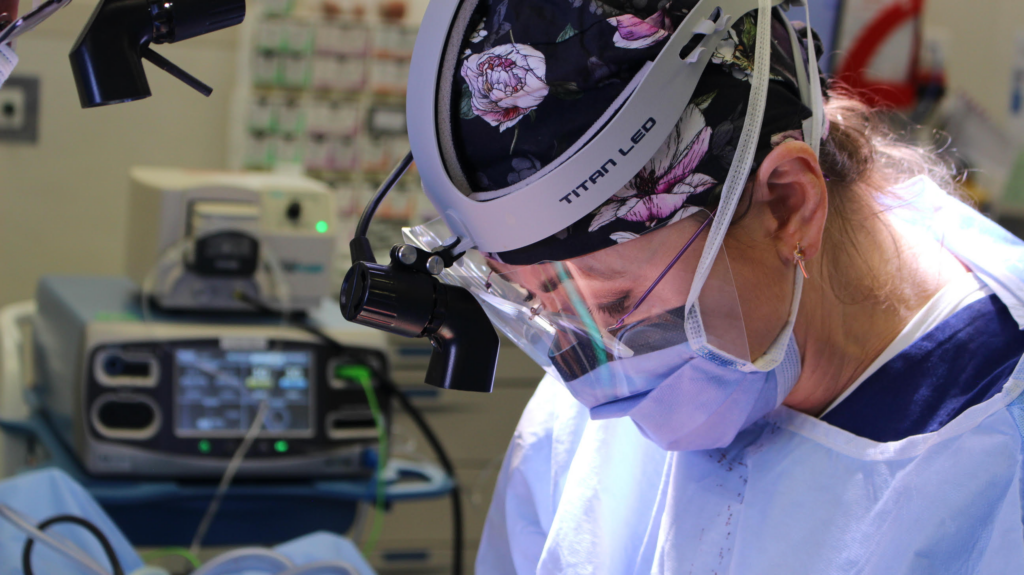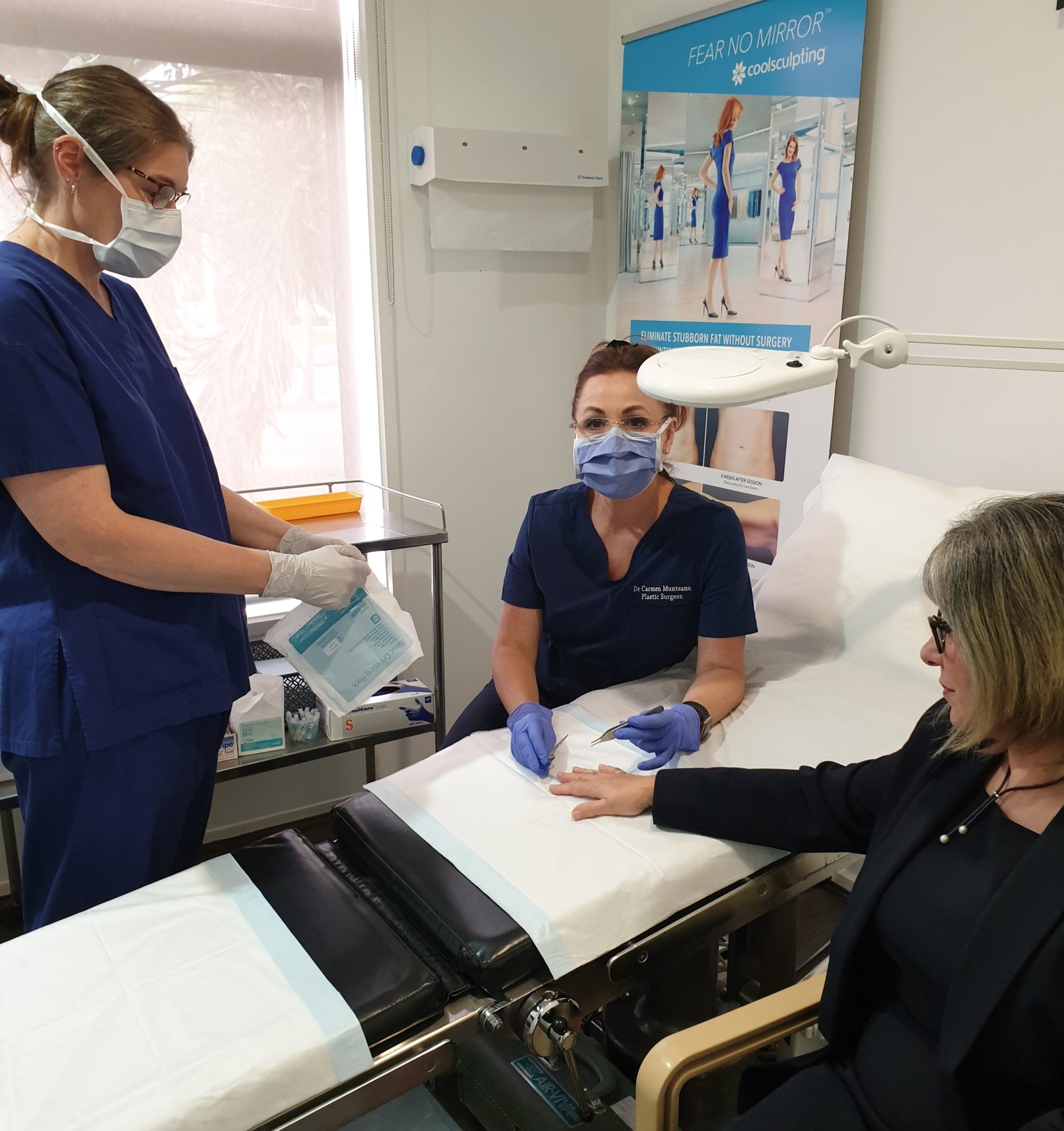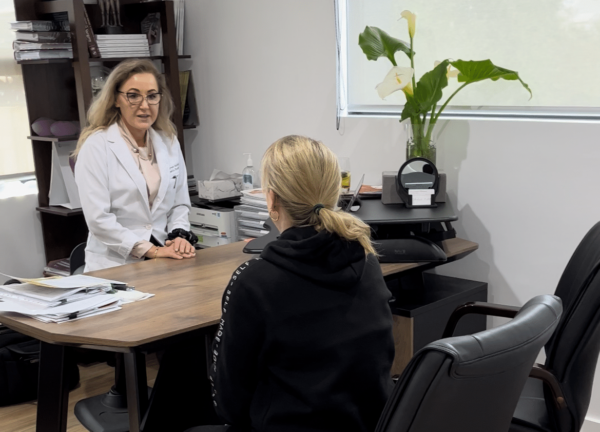Most of the people who undergo gastric sleeve surgery to shed excess weight are concerned about when they can start exercising to aid the results. It is a great way to assist your body in weight loss but the importance of the right timing cannot be denied. Let’s discuss what you need to do before the surgery.
Dr Carmen, is a Specialist Plastic Surgeon who assist patients with skin reduction surgery after their successful bariatric surgery. Most Bariatric Surgeons recommend doing mild to moderate exercise for at least 20 minutes a day for a month prior to the surgery. Your exercise routine must include a combination of cardiovascular exercises and resistance training. Working out prior to the surgery will improve your overall fitness, reduce surgical complications and set the stage for quick recovery. After your bariatric surgery is over, let’s look at the right way to exercise post-surgery.
Take our Plastic Surgery Quiz to find out if you’d be a good candidate and if you are ready for cosmetic surgery.
Exercising After Weight Loss Gastric Sleeve Surgery
You are probably excited to start an exercise routine. While it’s important to maintain great health and physique, you shouldn’t overdo it post-surgery. It can be damaging to incisions and slow down your recovery. Hence, we recommend walking in the initial phases of recovery and avoiding strenuous exercises for the first two months post-surgery. Let’s discuss an in-depth exercise timeline:
Exercise Timeline after Bariatric Surgery
1 Month post Bariatric Surgery
For the first week, start walking around the house. Aim at walking for at least five to ten minutes a day. Gradually increase the duration to fifteen/twenty minutes in the second week. By weeks three and four, aim at walking thirty minutes per day. You don’t have to do it all at once. Break it down into 3, ten minute walks if it gets too tiring.
2-3 Months post Bariatric Surgery
During this time, you can add cardio equipment from the gym. Walking can get pretty boring, very quickly. Use elliptical, stationary bikes and more cardio equipment. It is easier on your body, won’t put pressure on your incision sites and will get you in the routine.
4-6 Months after Bariatric Surgery
You can start adding weights to your workouts. Do resistance training with lighter weights and gradually build your strength up. If something feels extremely difficult, don’t push yourself too hard.
6-12 Months after Bariatric Surgery
Most patients are able to sustain a full strength workout by this time. You can do cardio, core exercises, strength training, stretching, weight lifting, and also play sports. Listen to your body and go with the flow. Most patients are able to do all high-intensity workouts without any complications.
It is important to remember that this is a general timeline. It is important to stick to the customized exercise recommendations given by your surgeon. Your surgeon knows how your body is healing and what it can handle. Hence, stick to the instructions.
Download Dr Carmen’s Guide to Excess Skin Reduction Surgery
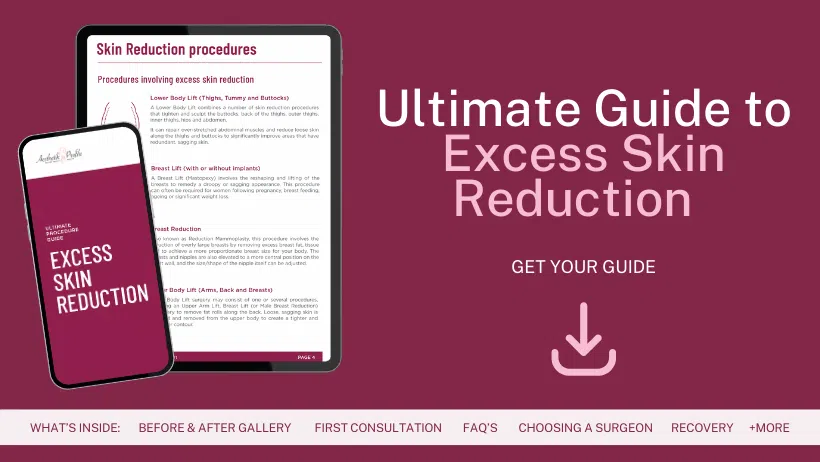
Benefits of Exercising After Bariatric Surgery
Here are the top benefits of exercising post gastric sleeve surgery:
- Exercising increases your cardiovascular endurance.
- You will have a healthy heart.
- Your body fat percentage will decrease over time.
- You will build lean body mass which boosts your metabolism and has several health benefits.
- It promotes a better mood.
- Exercising regularly boosts your health and reduces the chances of disease.
Tips for Smooth Recovery after Gastric Sleeve Surgery
Here are the top tips that will help you recover faster after gastric sleeve surgery:
- Follow the diet recommended by your surgeon. If you eat too much, it can lead to nausea and vomiting. If you eat too little, it can cause weakness and fatigue.
- Take two weeks off from work. This time frame will allow you to rest and heal properly. During this time period, you can walk lightly around the house but refrain from doing any other activities.
- Follow the exercise timeline given by your surgeon. Do not jump into exercising and lifting weights too soon. Start with walking and gradually build your way up as per the surgeon’s suggestions.
- Do not skip on the follow-up appointments under any circumstances. It ensures that you are not on the right path in your weight loss journey.
- Be proactive, educate yourself on the surgery, the lifestyle you need to follow after bariatric surgery. It will allow you to prepare yourself in a better manner.
- Do not skip on the multivitamins and probiotics recommended by your surgeon. They help boost your health and digestion.
- Take all the medication given by your surgeon on time.
- Drink water and keep yourself hydrated at all times.
- Do not drive for at least two to three weeks after gastric sleeve surgery.
- Invest in a good quality abdominal compression garment. Your body will continue to change after the surgery. The right compression garment not only corrects your posture but also improves blood circulation.
Tips for Recovery After Gastric Sleeve Surgery
Gastric Sleeve Surgery (Sleeve Gastrectomy) involves reducing the size of your stomach to a short tube shape. It works by making you feel full sooner so that you eat less. Recovery after Gastric Sleeve Surgery can be a challenge. Here are some tips to help you through the process, after your Gastric Sleeve Surgery.
As a Specialist Plastic Surgeon in Melbourne, Dr Carmen Munteanu has a particular interest and expertise in Body Contouring surgeries. These include Body Lifting (excess skin removal and liposuction) after Significant Weight Loss, such as after Gastric Sleeve Surgery or embarking on a complete nutrition and exercise makeover plan.
1. Follow the diet recommended by your weight loss surgeon
Eating solid foods too soon or food high in fats and sugars, could put you at risk of harming yourself or damaging your stomach. Make sure you aren’t ingesting foods which are high in calories, sugar, or fat. Doing this could result in nausea, vomiting, stomach cramps and other side effects. It is extremely important then that your follow your Surgeons Instructions. Always make sure you speak to your surgeon about how many calories you need each day. They’ll know you and your body and will give you a specific target catered to your particular needs.
2. Only Go Back to Work when you are ready
Your recovery time may vary, but it generally takes at least two weeks after surgery, before patients are ready to return to work. Only take on light duties when you do first return. Walking around, being slightly active, is good exercise, but don’t try anything like heavy lifting.
3. Exercise Gently when you can
It may be sometime before you can exercise fully, it is important to strengthen your muscles and get back to walking, or light exercise as soon as possible. Do not push too hard, and do too much too soon. Doing too much exercise could increase the chance of developing a hernia. Read our blog about Exercising after Gastric Sleeve Surgery.
4. Attend all your post-op check-ups
Scheduled follow up appointments with your doctor to ensure you are recovering well are very important. Doing so will ensure you are on the right path with your diet, exercise, and weight loss goals.
5. Educate yourself about Gastric Sleeve Surgery
Find new ideas and recipes so food doesn’t become boring after surgery. It’s important to stick to your new diet. Staying proactive so food doesn’t become boring, or stale will help you avoid foods you shouldn’t eat.
6. Take your multivitamins & ProBiotics regularly
It can be tough to get all of the nutrition you need from food alone. Taking multivitamins will ensure you are getting the right nutrients. Which particular vitamins you need should be recommended by your Doctor. This should be a lifelong forming habit, so start early with the right advice.
7. Ask for help & advice when needed
During the recovery phase, it can be difficult to move and get things done. Make sure you get plenty of rest and have a good support network to help you ease back into normal life. Phone Dr Carmen’s Patient Advisor if you have any questions, at any time after your surgery.
8. Follow your prescription and take your medications
Be sure to follow your surgeons prescription and do not finish or wean yourself off your medication early. You should let your doctor know if you’re feeling any discomfort.
9. Watch the calories in your drinks
You will need to limit your calories as part of the weight loss program including calories in your liquids. Instead of consuming calories on drinks that provide only empty calories, use your calories to eat proteins that will keep you feeling full and help your recovery. Only drink low-calorie drinks like water, sugar-free juices, and unsweetened ice tea.
As a Specialist Plastic Surgeon regularly consulting with post-weight loss patients in Melbourne, Dr Carmen is highly regarded for her dedication to specialty surgical procedures for men and women including:
Body Contouring & Body Lift Procedures after Weight loss include:
- Arm Lift (Brachioplasty)
- Thigh Lift
- Abdominoplasty (Tummy Tuck)
- Body Lift (including Buttocks Lift, Belt Lipectomy and/or Abdominoplasty procedures)
- Liposuction
Dr Carmen Munteanu has a particular interest and expertise in Body Contouring surgeries. These include Body Lifting (excess skin removal and liposuction) after Significant Weight Loss, such as after Gastric Sleeve Surgery or embarking on a complete nutrition and exercise makeover plan.
Exercise Recommendations after Gastric Sleeve Surgery
Once you are fully healed, these are the three areas you need to focus on; cardio, strength training, and flexibility.
1. Warm ups and Cool downs
This is a vital part of any workout routine especially when you are working out post weight loss surgery. Warming up prior to working out will get your blood flow going, warm up your muscles and get the heart pumping. It helps prevent injuries during workouts. Aim at doing warm-up exercises for at least five to ten minutes per day. You can do walking, jogging, or jumping. Cooling down is as important as the workout. The goal is to lower your heart rate and breathing. You can do a light walk, stretching, yoga to cool down your body. Do not skip these in any of your workout sessions if you wish to maximize the benefits of exercise and prevent injury.
2. Cardio
We all know that cardio is great for getting an energy boost and burn calories. By adding cardio to your exercise routine, you will have a better mood as it released endorphins, deep sleep, and increased energy throughout the day. Moreover, it gets the blood pumping and boosts your metabolism.
You can start walking in your recovery phase. Gradually start using an elliptical, stationary bike, then go for jogs, runs, hiking. You can also join fun dance classes, play sports or any other activity that you enjoy. The key is to get your body moving.
3. Strength Training
Strength training is critical to building lean muscle mass in your body. Not only that, it strengthens your bones, boosts your metabolism, and gives your body a more toned look. You can either go for Pilates or lift weights. Start small, a 2-pound weight is enough to get the journey started. Gradually, increase weights. Alternatively, you can do lunges, squats, sit-ups, crunches with weights. Doing a fifteen-minute strength training workout daily or every other day will build up your strength.
4. Flexibility
If you don’t want to injure yourself, flexibility is of critical importance. Do yoga, simple stretches before and after your workouts to avoid sore and stiff muscles. Be gentle with yourself and don’t push too hard. You will slowly start to become more and more flexible. Start with a five-minute simple stretch and slowly ease yourself into more advanced forms.
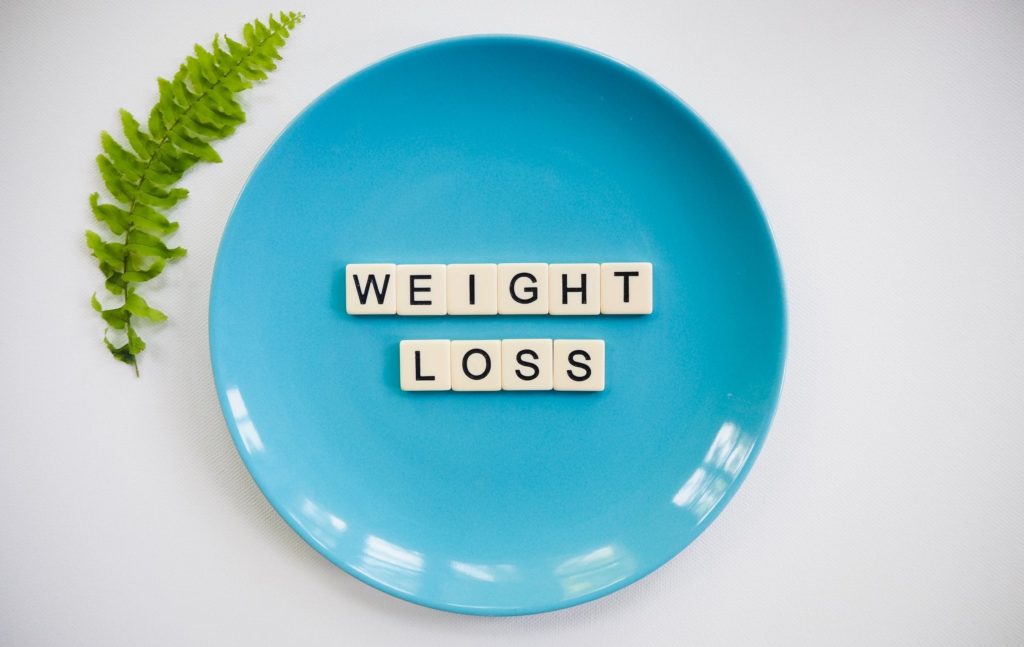
FAQS about Exercising and Weight Loss Surgery
How long do I need to stay in the hospital after weight loss surgery?
- Most patients stay one or two days in hospital to ensure the surgery was successful.
When can I go back to work after weight loss surgery?
- You can go back to work two weeks after the surgery provided that your job is not physically demanding. It is always a good idea to discuss with your surgeon when is the right time to return to work.
How bad is the pain after weight loss surgery?
- Your prescribed medication includes pain killers which should mean you will not feel any pain post-surgery. You might experience a bit of discomfort and stiffness.
When can I start exercising again after weight loss surgery?
- You can start walking almost immediately after the surgery. However, you will be required to wait for a couple of months before you can resume your workout routine. Generally, your surgeon will tell you when the right time to work out is.
When can I start lifting weights after the weight loss surgery?
- About four months after the surgery, you can start adding weights to your exercise routine. It is best to start slow and gradually increase the weights. Make sure to warm up your body before lifting weights and cool down at the end.
Do I need to take vitamins and minerals after weight loss surgery?
- Yes, you need to take multivitamins, probiotics and minerals after weight loss surgery if you wish to lead a healthy lifestyle. They are important for keeping your body healthy.
Which exercises can I do immediately after the surgery?
- You can do light walking immediately after the surgery. In the first month, walk for only five to ten minutes per day. Gradually increase the duration for up to thirty/forty-five minutes over the next three months.
What kind of foods can I eat after the weight loss surgery?
- Your surgeon will give you a complete diet plan to follow after the surgery. Here is a general overview:
- During the first week, you will be on a liquid only diet.
- By the end of the second week, you can introduce purees.
- During weeks three and four, eat soft, easy to digest foods.
- After this, you can eat normally. Try eating healthy though.
How much water should I drink post weight loss surgery?
- Aim at drinking about 64 to 96 ounces of water per day.
When will my incisions heal post-surgery?
- It generally takes about two to three weeks for your stomach incisions to heal completely. And it will take about six to eight for your staple line to heal.
Does smoking affect my weight loss surgery and recovery?
- Yes, smoking can affect your recovery. That is why your surgeon asks patients to quit smoking a few weeks prior to the weight loss surgery.
What are some long term benefits of getting bariatric gastric sleeve surgery?
- Apart from losing weight, bariatric surgery can help improve the following conditions; high blood pressure, sleep apnea, high cholesterol, type 2 diabetes, knee pain, body pain, hip pain, and urinary incontinence.
Can I eat solid foods immediately after the surgery?
- No, you cannot eat solid foods immediately after the surgery. You will be on a diet of liquids for the first week or two.
How should I sleep after weight loss surgery?
- You cannot sleep on your side or stomach for at least three weeks after the surgery. Sleep on your back in a semi-sitting position. Simply stack a pillow underneath your head and shoulders.
How long after bariatric surgery will I be able to see results?
- For most patients, the complete results show in about one year after the surgery. However, most patients are able to see a dramatic difference in their bodies one month after the surgery.
What happens if I start working out too soon after the surgery?
- You can disrupt your recovery, put stress on your incisions and end up doing more harm than good. Hence, stick with the surgeon’s exercise guidelines and assist your body with recovery.
When will I feel normal after the surgery?
- You can expect to feel normal in about three to five weeks after the surgery.
How long is the recovery after weight loss surgery?
- Most patients recover in about a month after the surgery, however each patient is different and heals at a different pace.
How much weight can I expect to lose after getting weight loss surgery?
- The weight loss is different for different individuals. On average, patients lose anywhere between five to fifteen pounds within the first three months of the surgery.
What should I wear post weight loss surgery?
- You can wear an abdominal compression garment along with some comfortable clothes that are easy to take on and off.

